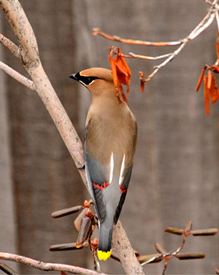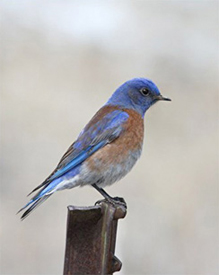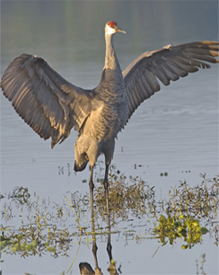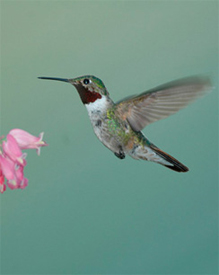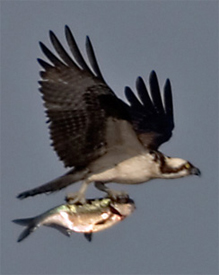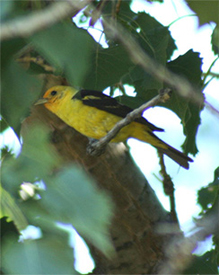Catalog of Courses
The goal of these courses is to provide a fun and educational insight into birds and their world. We learn to identify birds, but identification is only a beginning.
To know any bird, we begin by identifying it as a member of a species. Each species is different, each separates into subspecies, but all birds show similarities because of the way they evolved. In short, we try to see birds in the context of their biology and ecology.
In these courses, but increasingly in those with higher numbers, we look for differences among birds of the same species, we listen for messages in their vocalizations, we look for distinctive behaviors, and we observe how birds relate to each other, to various creatures, and to their environment.
This Catalog arranges courses in a sequential fashion, which assumes a progression from one level to another (100 to 200, e.g.), but you can begin where you feel comfortable. And you can repeat any course at any level to strengthen your understanding. Higher numbers mean more classes, more field trips, and more emphasis on avian biology, ecology, and conservation.
The Catalog describes each course in broad terms, to indicate cost, time commitment, the general approach of each, and how often it is offered. Specific dates, times and focus for this year’s courses are in the first part of the website. To send comments or suggestions, contact me at: mike4ffoster@gmail.com
Birding Adventures: Two multi-day trips to locations well beyond Greater Denver were launched during 2015 as an experiment. For those pioneers, the fun of finding different birds, in different habitats, at different sites, and during different seasons was worth the travel and a larger investment of time and money. Other Adventures may be announced via email, once I have identified suitable sites.
Meanwhile, here is a little background on what to expect. Enrollment is limited to eleven people so that (with me as the twelfth) we can explore in just three cars from our meeting point. Carpooling is arranged from Denver.
We will be in the field for more than our normal half day, but by no means all day, so there will be time for relaxing, socializing during meals, and whatever local activities present themselves.
There is no tuition for these Adventures. Individuals pay for their own room and board, and I will give an estimate of those expenses for all participants when announcing any Adventure. In return for doing the preliminary scouting, and arranging the logistics and business details, I ask that those who participate share equally in covering my lodging expense. Because I can estimate that cost quite accurately, I will ask participants to pay their share before we depart. That check completes your enrollment.
Drivers pay travel expenses (gas, oil, auto usage), but in return for driving, each is reimbursed at a certain rate per mile (higher rate for shorter distances), divided by the number of people in the car, including the driver. So for a trip of 400 miles, at 15 cents a mile, and assuming four persons in the car, the three riders would each pay the driver $15. At 25 cents per mile, each would pay $25. The driver apprises riders of the beginning and ending mileage, and keeps receipts. If actual expenses exceed the calculated rate, riders share equally in the overage.
After you have completed your enrollment, I will send a detailed itinerary of the sites we’ll visit and some of the birds we can expect to find. The sooner I can reserve motel space the better (you will then call in your deposit), so you are encouraged to sign up for an Adventure as soon as it is announced.
Birding 101, Intro to Birds and Birding $60-$80 3 or 4 classes, 3 or 4 field trips
For those who love nature, and are comfortable in the outdoors, but who have little or no knowledge of birds or experience in birding. You learn a technique for identifying unfamiliar birds, which also helps you notice more about familiar ones. That technique includes an introduction to bird song.
We’ll begin to connect birds to their habitats, and discuss a few facts about most of the birds we encounter, hopefully to whet your appetite to learn more on your own, or in another course.
101 is offered every year, either in spring or fall.
Birding 130, Ducks & Winter Residents $50 2 classes, 3 field trips
Also for beginners who want to learn the many ducks and other swimming birds that are prevalent in winter. We will also look for the hearty winter residents, many of whom reside here all year.
Field trips will visit different riparian or lake/reservoir habitats in the Plains grassland life zone. 130 is offered every year.
Birding 150, Refresher $50 2 classes, 3 field trips
150 is for those who have taken 101 or 130, or have equivalent experience, and who want to brush up their knowledge before tackling more advanced courses.
150 is offered periodically, especially if at least five people request it. The course could be available in any season.
Birding 201, Groups & Topics $40-70 1 to 3 classes, 3 or 4 field trips
For advanced novices who are ready to learn more, with increased emphasis on bird song. What separates 201 from the 100 level courses is an introduction to avian ecology and biology.
While learning to identify particular groups of birds by their songs, behaviors and traits, we will focus on one or more topics to enhance our experience of birds and begin to understand their place in nature. For example, while studying neotropical migrants we might pay special attention to their habitat affiliations, mating behaviors, and/or foraging strategies. If a course is repeated, the topics may change.
201 followed by 301 would provide a solid foundation for numerous birding endeavors: citizen-science projects through Cornell Lab of Ornithology, national or international trips, college level ornithology, breeding bird surveys, studies of Important Bird Areas, or favorite sites.
Prerequisite: any of the 100 level courses, or equivalent experience.
Birding 201 may not be offered every year. When it is, it will be during the season appropriate for the topic.
Birding 301, Groups & Topics $70-90 3 or 4 classes, 4 or 5 field trips
301 is an advanced version of 201 for the intermediate birder. It offers more avian science and some conservation.
301 will focus on varying groups and topics from time to time.
Prerequisite: any of the 100 level courses, or equivalent experience.
Birding 301 may not be offered every year. When it is, it will be during the season appropriate for the topic.
Birding 401, Ecology Research $100 4 classes, 6 field trips
For advanced novices and intermediates. The purpose of this experimental course is to stretch enough to be educational, while accomplishing enough to be satisfying. Individuals will create different projects within a defined area, large enough to provide multiple habitats but small enough to be manageable for a study of six weeks. I will suggest suitable locations, and the group will help design a series of complementary studies within it.
Among the individual projects might be such studies as habitat affiliations, niche positions, guilds and the food web, foraging strategies, mating behaviors, or influence of edge effects and the climax community. These possibilities are meant to be suggestive, not exclusive.
Besides researching individual projects, group members will contribute to a synthesis of the area. At a minimum, we will want to document the richness and abundance of the avian species, also the number and balance of families within the study area. We will distinguish the birds of each habitat and determine the amount of overlap between habitats. We will need at least a preliminary assessment of food and other resources, and a sense of which adaptive traits have allowed birds to exploit those resources. We will try to identify all the fauna and flora within the area, in order to estimate which support, threaten, or compete with the several bird species. We may find species of special concern and be able to comment on their status.
Prerequisite: 201 or 301.
The course is available in any season, whenever five or more people request it, but only once in any year.
